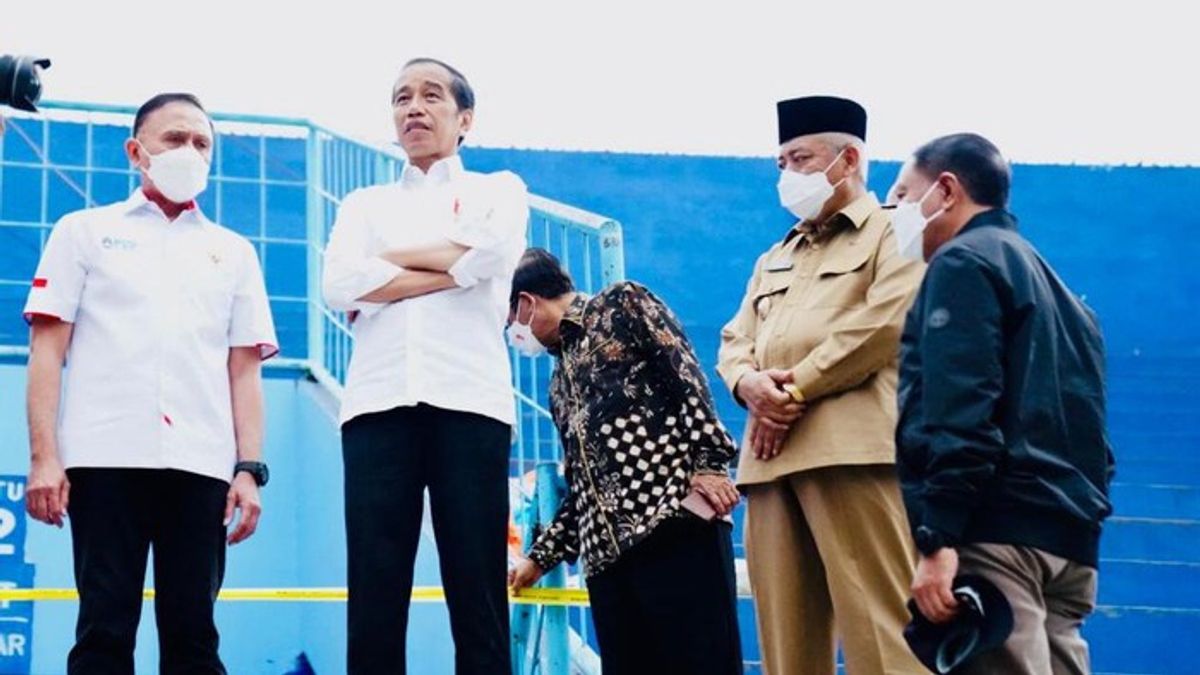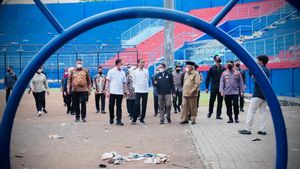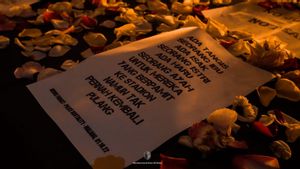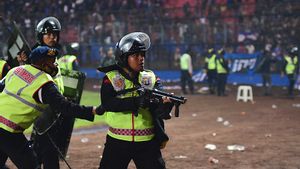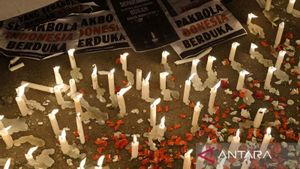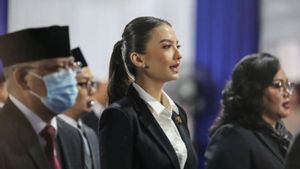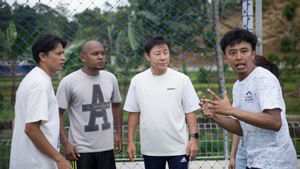JAKARTA - What is the punishment that FIFA will give to Indonesian football after the tragedy of the Kanjuruhan Stadium in Malang, last 1 October? Can Indonesian clubs no longer compete at the Asian level for a while? Is Liga Indonesia done without spectators? Is League 1 frozen? Or, will Indonesia's status as the host of the U-20 World Cup be revoked?
This question has often become a hot topic of discussion among the public after the Kanjuruhan Stadium tragedy. A reasonable guess, especially if you look at the number of victims and the mechanism for handling the match between Arema FC vs. Persebaya Surabaya.
Referring to data from the East Java Provincial Health Office, the tragic incident at the Kanjuruhan Stadium caused 131 people to die and more than 600 people to be injured.
However, this assumption was not proven. FIFA did not even give any sanctions for Indonesian football.
“Yesterday, I received a letter from FIFA. This is a follow-up to the results of my telephone conversation with FIFA President Gianni Infantino on October 3, 2022. Based on the letter, Alhamdulillah, Indonesian football has not been sanctioned by FIFA,” said President Jokowi on October 7, 2022.

FIFA is even ready to collaborate to help the government transform Indonesian football.
"FIFA will form an Indonesian football transformation team, and FIFA will be based in Indonesia during these processes," President Jokowi continued as reported by the Presidential Secretariat YouTube.
Gianni Infantino, in his letter dated October 5, 2022, said FIFA would provide support to prevent a repeat of a similar tragedy.
FIFA and the AFC will work closely with Indonesian government authorities and PSSI to address the conditions that triggered the incident at the Kanjuruhan Stadium, and more broadly help reform Indonesian football.
Despite the gravity of the case, and the fact that it could lead to a suspension of sanctions, FIFA instead proposes collaborative efforts in several ways, namely:

- Stadium Safety Standard
- Comprehensively review and improve the safety standards of all national stadiums, international stadiums, and related facilities in Indonesia.
- Special focus on the mechanism for separating police and security officers, supporters and players before, during and after the game.
- A complete review and improvement of the security system around the stadium and facilities should also be completed.
- Police Security Protocols and Procedures
- Standard policies for police and security personnel on crowd management before, during and after matches should be developed in accordance with international safety standards.
- This should include the integration of training programs specifically tailored to sporting events in various formats.
- Socialization
- Have a formal dialogue with the club as a forum for exchanging information and generating input for the implementation of the process, where relevant.
- Supporters should be invited to be part of the reforms, to provide their feedback and views, and through agreements and frameworks aimed at preventing situations with a higher risk of escalation of violence.
- This process must be facilitated through the creation of a database of supporters by the club and PSSI.
- Match Scheduling
- The match schedule will be reviewed, with the aim of avoiding match times that may increase risk factors.
- This could include consideration of scheduling matches as late as 5 pm and television only on Saturdays and Sundays, reflecting the correlation between earlier kick-off times and reduced incidence of violent events elsewhere.
- Of course, this is done by considering the transportation infrastructure factor. Among other things, by facilitating easier access for supporters.
- A more consistent match schedule should also allow for a more coordinated and regular presence of security personnel to support matches.
- Awareness campaigns among supporters and the general public should be launched to ensure that supporters can anticipate all potential problems.
- Mentoring and benchmarking
- Outreach to other institutions and experts in the field of stadium safety and security should be undertaken to establish systematic benchmarking toward best practices globally.
- A mentoring team should also be formed from a pool of expert collaborators to provide direct advice on actions and programs undertaken as part of broader reforms.
“I thank you for all the efforts made and for your important contribution to the development of our sport and the promotion of its values in Indonesia. I hope, Your Excellency the President, to see you soon,” Gianni concluded.
Indonesia's Reputation
Indonesia will host the U-20 World Cup in 2023, and is also bidding to host the 2023 AFC Asian Cup. These are two major tournaments. According to Simon Chadwick, not only reputation, its implementation certainly provides significant economic and political benefits for a country.
Losing the right to organize a tournament and failing to get the right to host a tournament will damage the reputation of Indonesia, whose international status is currently growing.
Simon Chadwick is a Professor of Sport and Geopolitical Economics, Scheme Business School in Paris.

FIFA will of course monitor Indonesia's development very carefully. As a world football organization, FIFA certainly doesn't want to disappoint its sponsors by holding a tournament in a country with a high threat of violence.
"Violence or worse, the death of a supporter will be bad for FIFA. It affects its image, reputation, and commercial activities,” said Simon on Channel News Asia.
Indonesia and its authorities must ensure that this does not happen again.
“Perhaps Indonesian football will enter a new era, marked by better organization and management. Maybe the country will rise to a new position in world football," he said.
“The question is, does the country have the political, economic, and social will to make the necessary changes?” Simon emphasized.

Previously, President Jokowi did not deny that the governance of Indonesian football had to be improved as a whole.
"I think we really need a total evaluation of everything, both match management, stadium management, audience management, time management, security management. Everything must be thoroughly evaluated so that the events that occurred at the Kanjuruhan Stadium do not happen again," said President Jokowi.
SEE ALSO:
The English, Chinese, Japanese, Arabic, and French versions are automatically generated by the AI. So there may still be inaccuracies in translating, please always see Indonesian as our main language. (system supported by DigitalSiber.id)
